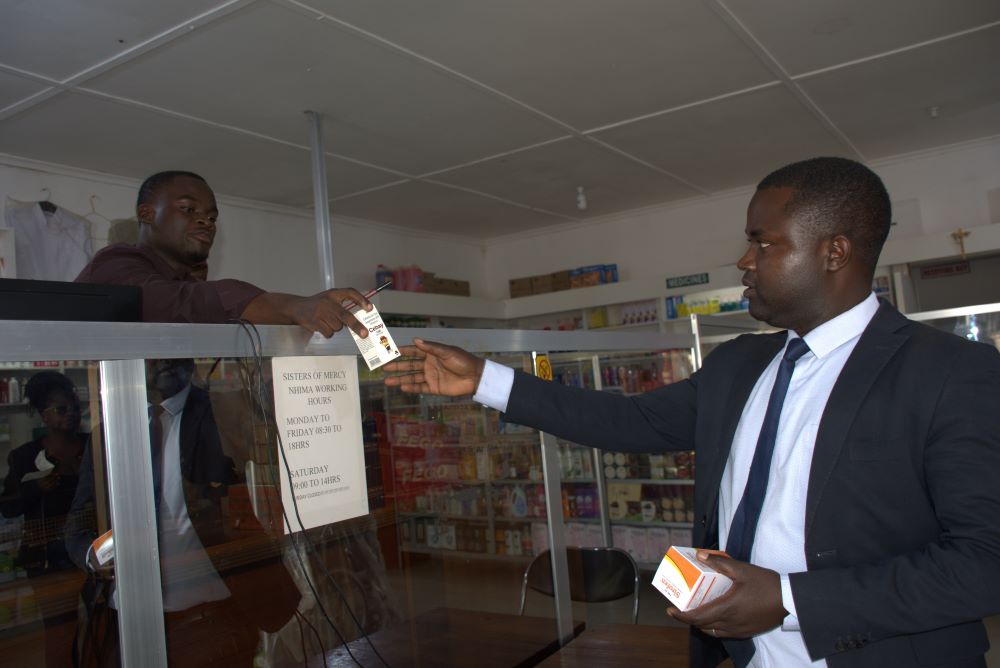
Alex Mtonga receives prescription medication for his son over the counter at the Sisters of Mercy Pharmacy in Mansam Zambia. It had been difficult for Mtonga to get the medication from most public health centers, a longtime problem in the region. (Derrick Silimina)
In the heart of Mansa, northern Zambia, sits a beacon of hope and healing where faith and modern medicine converge to serve the most vulnerable people.
As Virgil Mwansa steps through the Sisters of Mercy Pharmacy's entrance, soft light filters through the windows, illuminating the meticulously organized shelves of medicine.
"I have a lifelong eye condition and depend on this pharmacy to access the Timolol drugs. This medicine is rare to find in most public health facilities but it is always stocked in this facility," Mwansa told Global Sisters Report.
After Mwansa battled glaucoma for five years, Timolol has been an effective treatment. The eye condition is characterized by increased intraocular pressure that can damage the optic nerve and result in vision loss, requiring ongoing management.
Mwansa, a 61-year-old resident of Chipili district, 85 kilometers (53 miles) northwest from Mansa, said the medication has helped prolong his eyesight and preserve his vision.
"I need this medication all the time and it's only 2.5 milligrams per tube. So, you can imagine, each time I use it, it finishes quickly, meaning I can't do without it," he said. "I have to go back to the public hospital, queue and then after a prescription, they always don't have it and I have to come to this chemist."
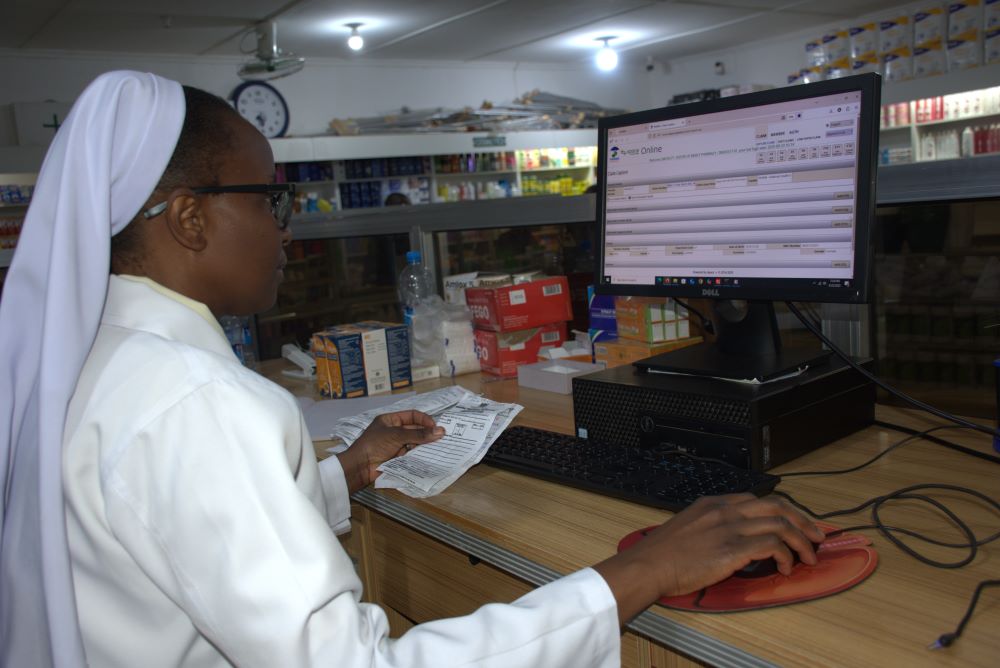
Sr. Audrey Chungu works in her office at the Sisters of Mercy Pharmacy in Mansa, Zambia. Chungu, a pharmacist, said she hopes the pharmacy's health care delivery model will not only help patients but enhance affordability and foster trust in health services across the country. (Derrick Silimina)
Zambia has been grappling with persistent and serious shortages of essential drugs and medical supplies in its public health facilities. Shortages have substantially weakened the health care system and negatively affected citizens, especially those living in rural and underprivileged areas, by limiting access to necessary medical treatment and services.
The people of Luapula province have endured a severe shortage of drugs in public hospitals for years, leading to a situation where a diagnosis could be life-threatening because essential medications were unavailable.
For this reason, the Sisters of Mercy founded a pharmacy in 2011 to improve access to medicines in the province. Led by Sr. Rosemary Mushibwe, the then-superior general of the Sisters of Mercy, the initiative aimed to address the challenges caused by the lack of local retail pharmacies, which previously forced residents to purchase medicines from Lusaka, resulting in delays and difficulties.
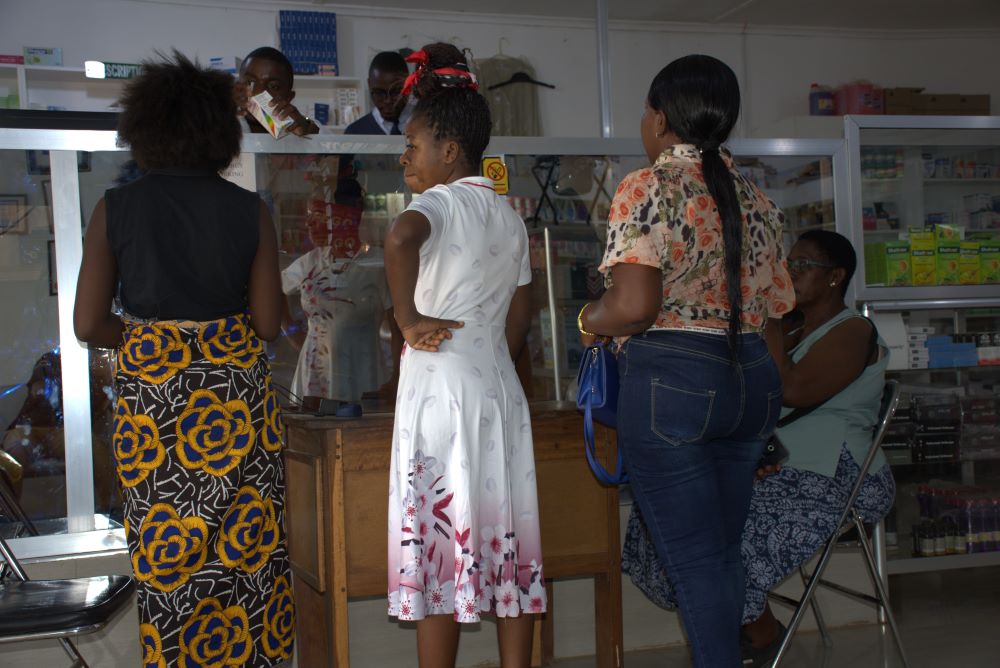
Patients wait to pick up medication prescribed at public hospitals at the Sisters of Mercy Pharmacy in Mansa, Zambia. The pharmacy serves patients who use national insurance or cash. (Derrick Silimina)
"This is the only retail pharmacy where clients from all hospitals across districts and the Provincial Hospital come to access NHIMA-covered drugs. We're overwhelmed but it brings us great joy to fulfill our charism of compassion," Mercy Sr. Audrey Chungu told GSR. "We are proud to extend our services especially to the elderly people and chronic patients, providing 97% of the medications they often cannot access from hospitals."
NHIMA is the National Health Insurance Management Authority.
Known in their native tongue as "Ba Mama wa Luse," meaning "Mothers of Compassion," the sisters' calling reflects their charism, which emphasizes compassion and merciful service, particularly for the poor and vulnerable.
Alex Mtonga's 2-year-old son was diagnosed with a rare condition that required surgery and resulted in a five-day hospitalization. However, the unavailability of the costly prescribed drugs in most public health centers presented a significant challenge.
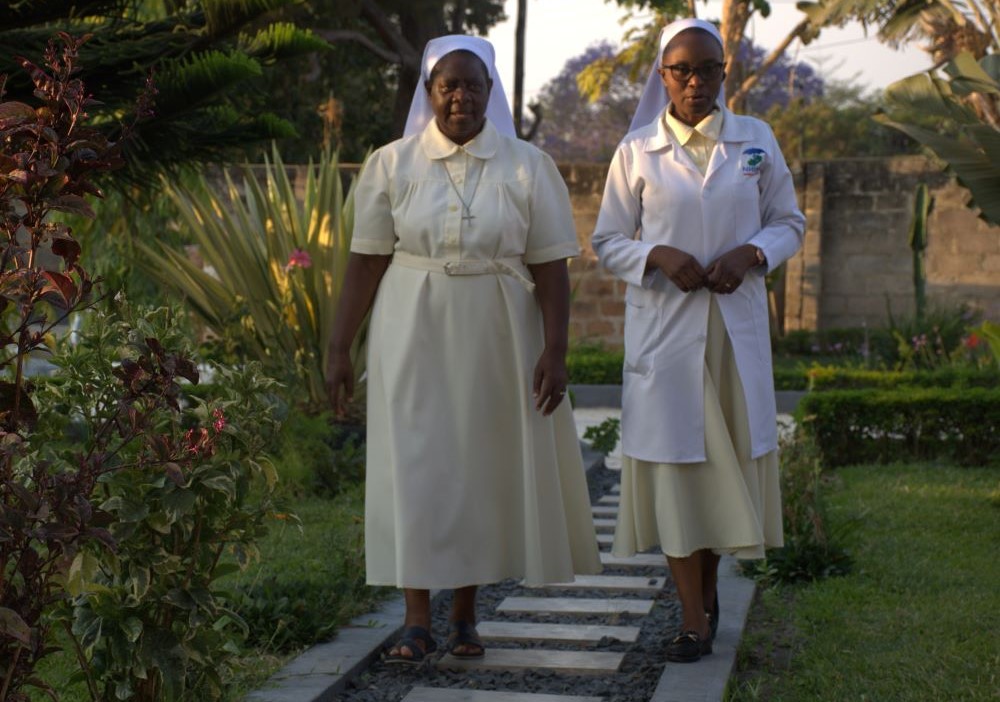
Sr. Delphine Kalisha, left, superior general of the Sisters of Mercy congregation, poses for a photo with Sr. Audrey Chungu. The congregation opened a pharmacy in 2011 to address medication shortages in the region. (Derrick Silimina)
Fortunately, Mtonga was able to utilize his medical plan through NHIMA to access the necessary medication, underscoring the crucial role of health insurance schemes in enhancing access to essential medicines and health care services for vulnerable populations in the southern African country.
Mtonga, a police officer by profession, is adamant that the Sisters of Mercy Pharmacy is a significant factor in enhancing the quality of health care services not only in Mansa but across the entire Luapula province. He said that the facility's contribution is a gamechanger in ensuring accessible, quality health care for the community.
"I am very happy that this is the only chemist accredited to the NHIMA here in Mansa and is well-stocked with essential drugs. After I accessed the prescribed medication here, my son got treated, discharged and is recovering well," Mtonga told GSR.
Isabel Chileshe's search for recommended fertility medicines nearly proved futile. However, after a recent tour of duty from her homebase in Samfya district to Mansa, she was able to find the exact prescribed medications at the Sisters of Mercy Pharmacy.
"I am proud to reveal that after a few months, I conceived … This pharmacy indeed plays a key role in providing access to vital health care products in the region," Chileshe told GSR.
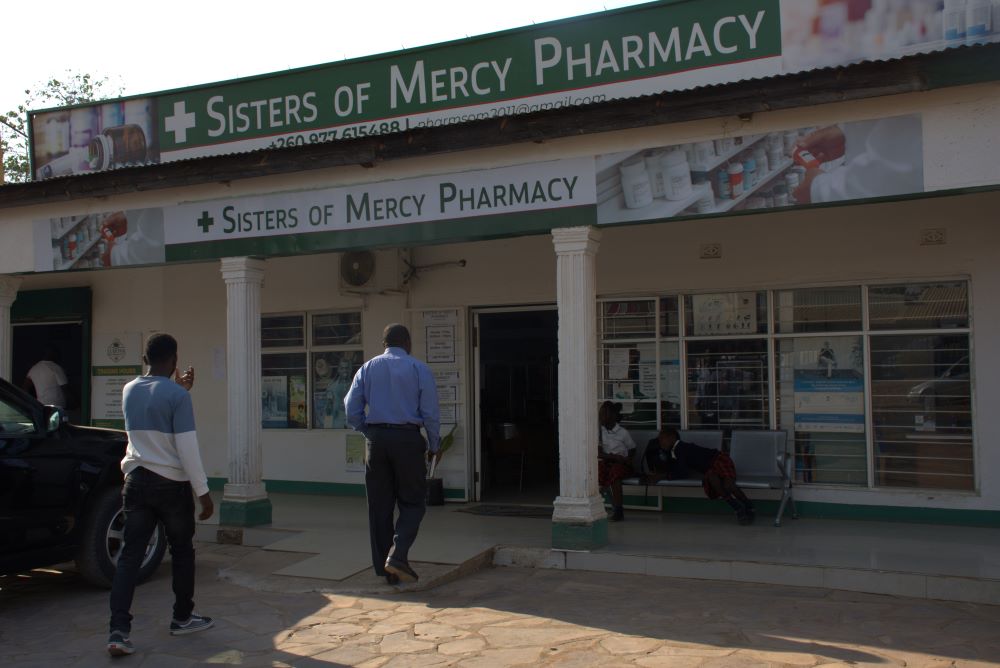
The Sisters of Mercy Pharmacy opened in Mansa's central business district in Zambia in 2011 to improve access to medication in the area. Medication shortages have weakened the health care system and limited access to medical treatment and services. (Derrick Silimina)
Behind the counter at the pharmacy, Chungu said that her dedicated staff form the core of the pharmacy's operations. In addition to dispensing drugs, they offer patient support through kind words, a caring approach and attentive listening.
Chungu said that the pharmacy service area extends across the province, including the Copperbelt and Northern provinces. She noted that the pharmacy serves about 110 clients per day under NHIMA, while about 160 patients purchase medications on a cash basis.
Chungu, a pharmacist holding a bachelor's degree from the Lusaka Apex Medical University, is optimistic that this health care delivery model will not only ensure the timely provision of essential medicines but also enhance affordability and foster trust in health services across the country.
Advertisement
Between 2011 and 2015, Sisters of Mercy Pharmacy was the only pharmacy in Luapula province. Others have since followed their model, and about 13 pharmacies now operate in Mansa, Chungu said.
Despite challenges like limited resources for procurement and inadequate infrastructure, Chungu said she remains committed to adding more pharmacies within the next five years.
She said the welfare of children suffering from ailments like sickle cell and diabetes motivates her to continue the work.
"I have a strong desire to serve the children and provide them with better service so that they receive the necessary medicine promptly," she said. "Also, the positive feedback from the general clientele serves as a source of motivation and encouragement for me and my team to respond to our duties."




